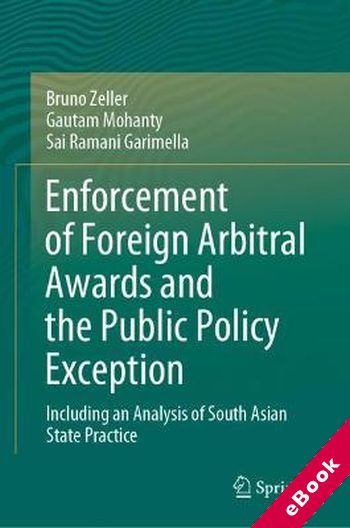
The device(s) you use to access the eBook content must be authorized with an Adobe ID before you download the product otherwise it will fail to register correctly.
For further information see https://www.wildy.com/ebook-formats
Once the order is confirmed an automated e-mail will be sent to you to allow you to download the eBook.
All eBooks are supplied firm sale and cannot be returned. If you believe there is a fault with your eBook then contact us on ebooks@wildy.com and we will help in resolving the issue. This does not affect your statutory rights.
The book presents arguments derived from primary sources related to international arbitration in South Asian jurisdictions, a list of the same is made available therein. The book is a research statement on the contemporary concerns within international commercial arbitration, especially related to enforcement of foreign arbitral awards. Importantly, the book through a unique methodology of interface, presents the gratuitous nature of Article 34 of the UNCITRAL Model Law when read with Article V of the New York Convention, especially the plea to the States within Article VII of the same Convention to ease the restrictions and the process of enforceability of foreign arbitral awards. The book also articulates another important and immediate need with regard to international arbitration - the delimitation of public policy exception to recognition and enforcement of foreign arbitral awards. It critiques the jurisprudence related to arbitration in jurisdictions spread across different geographic regions, thereby enabling the reader to gain an insight into their practices, apart from ensuring a comparative perspective. The book addresses the primary concern related to international arbitration - enforcement of foreign arbitral awards and the grounds for challenges articulated within the New York Convention and the UNCITRAL Model Law. It addresses these grounds, and articulates the necessity for carving the criteria for the application of public policy exception.
The book will not only be a useful resource for policy makers, students and researchers interested in international commercial arbitration, and private international law, but also for practitioners working on dispute resolution in trans-jurisdictional disputes in South Asia and beyond.